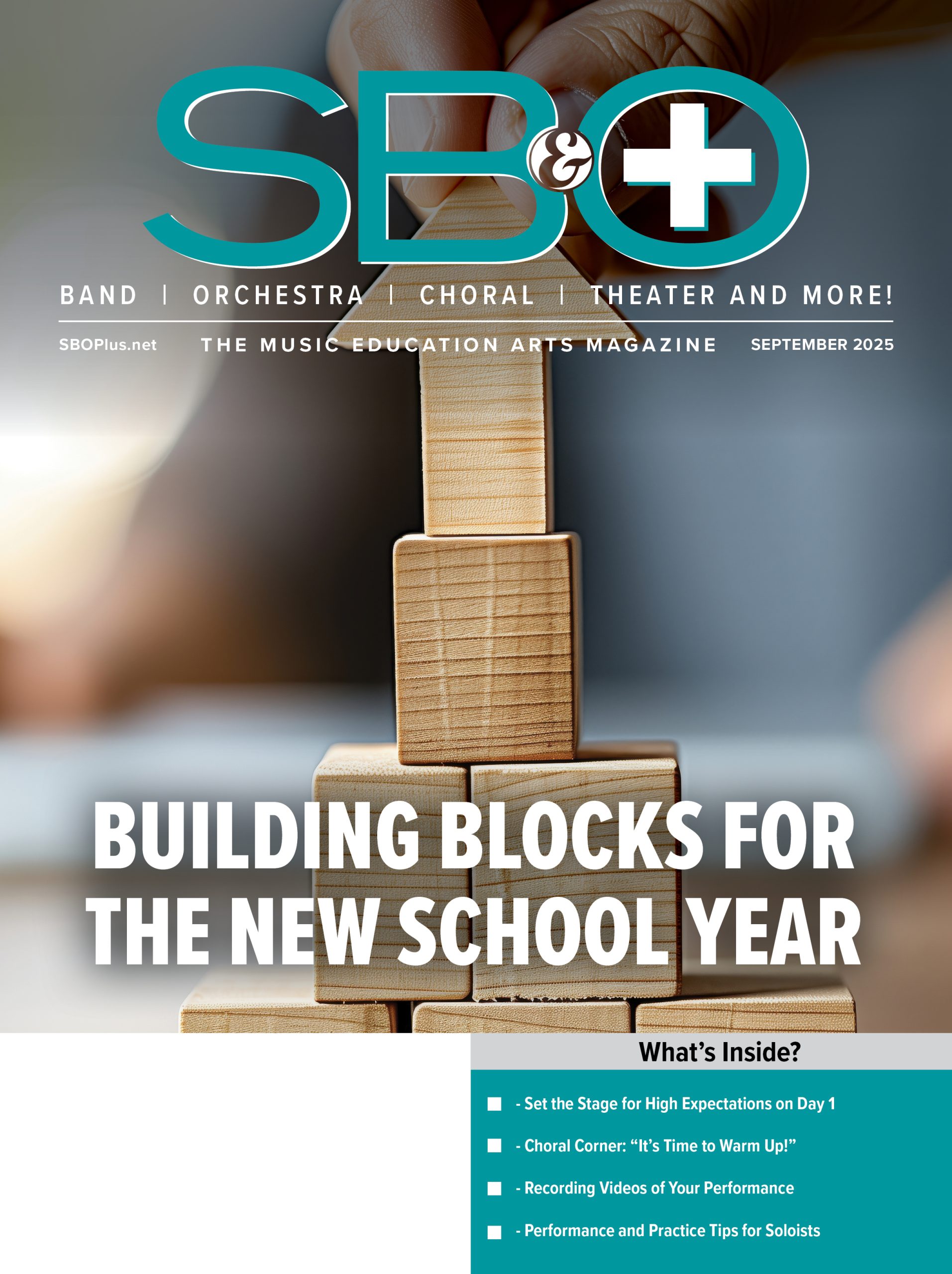By John C. Hughes
The “Bard of Avon,” William Shakespeare (ca. 1564–1616), has made arguably the greatest contribution to English literature of any single person in history. It is no surprise then that many composers have set his texts to music. While there are many well-known settings, in my reviews I have chosen newer and lesser-known works. Programming an entire set or even concert of Shakespearean settings would afford conductors the opportunity to delve into the texts with their choirs. If the text is drawn from a play, perhaps a portion of a rehearsal could be spent acting the scene out. As directors and singers reflect upon how the music captures the text’s drama, remember to share these discoveries with the audience, who will be grateful for the guided listening. Enjoy these pieces and feel free to share your favorite musical settings of Shakespeare with me.
UNISON
“Fancie”
by Benjamin Britten
Boosey & Hawkes
Medium-Easy
Originally written for solo voice and piano in 1961, this choral adaptation first appeared in Classical Songs for Children (1964). The majority of the work is reminiscent of a solo art song; however, at the end, the voices divide into three parts. Taken from Shakespeare’s The Merchant of Venice, “Fancie” is a riddle; the character of Portia gives clever hints through the rhyme scheme so that her lover Bassanio may give a correct answer to win her hand in marriage. The backstory of this piece is worth exploring with your singers. Although written for children’s voices, this piece is often performed by choirs of all ages. Singers will enjoy Britten’s clever text setting, slight chromatic alterations, and whimsical piano part.
boosey.com
TB
“Take, O Take Those Lips Away”
by J. Edmund Hughes and
Mary Ellen Loose
Santa Barbara Music Publishing
Medium
“Take, O Take Those Lips Away” draws its text from Measure for Measure. Published in 2011, J. Edmund Hughes and Mary Ellen Loose conceived of this piece as the second work in a three-piece set: A Shakespeare Suite. The first piece is for women; this, the second piece, is for men; and the set concludes with an SATB composition. All are worthy of consideration and can incorporate minimal staging. This middle movement allows the men to sing a lush ballad, complete with a flowing piano accompaniment. The memorable melodic writing and straightforward harmonies make this piece fairly accessible; however, a brief four-part section will require independence and confidence. A score preview and audio recording are available.
goo.gl/KmvL6h
TWO-PART
“Three Madrigals”
by Emma Lou Diemer
Boosey & Hawkes
Medium-Easy
Many choral conductors know Emma Lou Diemer’s famous set of “Three Madrigals.” However, the well-known version is for SATB voices. In 2008, Diemer arranged these works for two-part choir. Since the original SATB publication in 1962, these pieces have been standards on festival and contest lists across the country, and now, smaller and/or younger choirs can enjoy them too. With interesting piano accompaniments, rhythmic drive, and innovative harmonic language, this new version of Diemer’s immortal works will certainly be welcomed onto many concert programs.
SSA
“Fear No More the Heat O’ Th’ Sun”
by David Ashley White
Alliance Music Publications
Medium-Advanced
Written in response to the events of September 11, 2001, David Ashley White’s setting of “Fear No More The Heat O’ Th’ Sun” is a powerful testament to life. Taken from Shakespeare’s Cymbeline, the text is both reverent and uplifting. Three parts throughout, the texture may challenge inexperienced choirs, but the expressive, neo-Romantic harmonies make the hard work worthwhile. A score and audio preview are available.
goo.gl/0I4nB9
SSAA
“Take, O Take Those Lips Away”
by Robert A. Boyd
Colla Voce
Medium
Robert A. Boyd’s setting of this text from Measure to Measure captures the text’s melancholy. Boyd’s writing is succinct, only 51 measures, which shows a great deal of artistic restraint. The obbligato flute part is integral to the piece and complements the timbre of fine women’s choirs. Although there is some four-part writing, the majority of the piece has a reduced texture and reuses melodic content making it more accessible. A score preview is available.
goo.gl/tzvF4J
SATB
“Blow, Blow Thou Winter Wind”
by John Rutter
Oxford University Press
Medium
Many composers set passages from Shakespeare’s serious plays. Here, Rutter chooses a section of the comedy As You Like It. The text for this piece is not humorous, and it is not as commonly set as some other Shakespearean texts. “Blow, Blow Thou Winter Wind” fits well into many winter concert programs because the text is completely secular, but still manages to capture the cold scenery of the season. The haunting melody in F Minor comprises most of the work and is quickly learned. A piano accompaniment aids intonation and supports the choir.
oup.com
“Sigh No More Ladies”
by René Clausen
Mark Foster (Shawnee Press)
Medium-Advanced
René Clausen, conductor of the renowned Concordia Choir, composed a jubilant setting of this famous Shakespearean text. The rollicking piano accompaniment introduces the piece’s main motives and rhythmic character. Alternating between 4/4 and 6/8 (felt both as two groups of three eighth notes and three groups of two eighths), the meter constantly shifts to accentuate the text. The four-part divisi occurring in the women’s parts and transitional seams will stretch some ensembles.
shawneepress.com
“Shall I Compare Thee”
by Nils Lindberg
Walton Music
Medium-Advanced
Swedish composer Nils Lindberg’s jazz-influenced harmonies and pliable tempi make this setting of Shakespeare’s eighteenth sonnet memorable. The close harmonies are riddled with dissonance and require expert musicianship for this unaccompanied piece. A joy to sing as well as to conduct, conductors will enjoy freedom to shape dynamics and phrasing. This is a wonderfully expressive setting of a stunning text.
waltonmusic.com
“Ophelia”
by Jocelyn Hagen
Independent Music Publishers Cooperative
Advanced
Jocelyn Hagen is an established Minnesota-based composer who is enjoying increasing national prominence as a composer. Her setting of this passage from Hamlet (Act IV, Scene VII) is when Queen Gertrude tells Laertes that his sister Ophelia has died. The homophonic texture and syllabic text setting fully draw the listener’s attention to the text. Hagen frequently shifts meters and employs interesting rhythms to capture the text’s natural prosody. Interestingly, Hagen sets several lines, which in the play are indicated to be sung, as stage whispers to capture Ophelia’s descent into madness. The unique harmonic language and exposed singing required in this piece make it quite difficult; however, it is a beautiful and innovative work written by a very talented living composer. Full score and audio previews are available.
goo.gl/k0Hd6T
Four Shakespeare Songs
by Jaakko Mäntyjävri
Sulasol
Advanced
Jaakko Mäntyjärvi is Finnish composer who has enjoyed international recognition for his many works. Mäntyjärvi’s day job is as a certified translator between English and Finnish and vice versa, which undoubtedly demonstrates his knowledge and love of the English language. His choice to set four famous Shakespearean texts (“Come Away, Death”; “Lullaby”; “Double, Double Toil and Trouble”; and “Full Fathom Five”) is therefore not surprising. Although these four compositions are included in the octavo, it is not necessary to perform them as an entire suite. Rather, excerpt one or two. My favorite is the setting of the witches’ recipe in “Double, Double Toil and Trouble” (text taken from Macbeth). The notated shrieking, whispering, and stomping capture the spooky scene and make this a perfect choice for a Halloween concert.


























